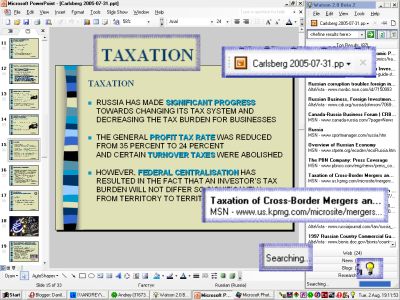
A view from the Peter and Paul fortress.
Technology, science, transhumanism.
On the left is a fat Georgian magic healer. In the middle a hippy-like clairvoyant that looks like a horse. And the host on the right. I can't believe that anyone is falling for that shit, but apparently some do, they all looked serious. Unbelievable, now I want to gouge my eyes out. I think I better to go read randi.org to ease the pain a bit.
Australian company Astrovision announced plans to provide real-time satellite video (first of Australia) with resolution down to 250 metres.
"Users [will be] able to select destinations and zoom in to as close as 60 metres and to as far out as 57,000 kilometres. ...Astrovision plans to launch five satellites to provide coverage of the globe over a decade."
In the future more and more information about the world will be available to us indirectly (i.e. we won't see it with our own eyes) and this information will be multi-facetous, instant, customized and interactive.
In a sense, this is about gradually become omnipresent. Ultimately every human will be able to instantly know everything that is happening anywhere on Earth, know about every raindrop falling, every leaf trembling. Just like gods. Isn't it cool?
Posted to Future Wiki
It's very original, both music and animation are very good. Short clips can be downloaded from the Animusic website. ATi has a real-time version of "Pipe Dream" and the video version. The DVD can also be downloaded from eDonkey network.
There are two distinct components in it.

Watson gets the keywords from the document and searchs for them, showing the results in a side panel

The results are surprisingly relevant and often very useful
It saves you the hassle of carefully thinking about relevant search queries. The document you are editing becomes one big search query and the results (a few hundred links, usually) come almost instantly. So far I have only tried it on existing documents, but it should be interesting to try to use it while writing a new document, augmenting my knowledge and memory with the power of the Internet. :)
Obviously, in the future automatic context-sensitive search will become much more common. Computers will be presenting us with hints, ideas, reminders, based on what we are doing, reading, talking about. The amount of available data, including our photos, e-mails, posts, conversations, etc. is growing very fast, as well as the amount of relevant information online. In the past it made sense to perform research (originally a literature search, later a google search) before writing a paper or preparing a presentation. But increasingly this becomes redundant and useless, as the amount of useful and relevant information often far exceeds our need in it.
So it makes sense to pay less attention to getting all the information. The computer should just give us something and we will use it. This is how our memory works - we are not trying to produce a perfect recollection of our past actions or of school knowledge that we acquired - we simply use what our subconsciousness gives us. A good illustration to the expected future of search is in Charles Stross's Accelerando, where search agents are running on human exocortices.